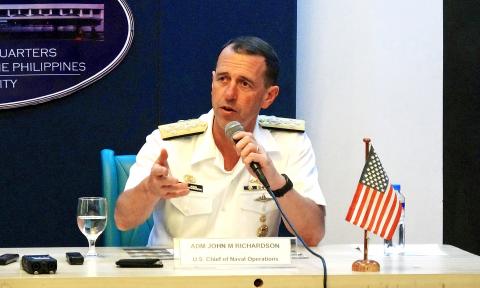The US military will continue to advocate free navigation through international waters, including the Taiwan Strait, a top US Navy official said on Monday.
“Parts of the Taiwan Strait are international waters. They are accessible to all who want to pass through them,” US Chief of Naval Operations Admiral John Richardson said at a press conference at Camp Aguinaldo, Quezon City, Philippines.
“They’re part of the global commons, which is the foundation for free navigation, and so in this area, the United States and the United States Navy will continue to advocate for free navigation through those international waters, where we will operate and sail and fly or enter wherever international law allows,” Richardson said.

Photo: CNA
The US official’s comments were made in response to a question from Central News Agency on how he sees the current situation in the Taiwan Strait, and what the US military would do to help maintain peace and stability there.
He was non-committal on what operations the US might have planned in the region for the future.
“I think it’s not healthy to speculate on those sorts of things, but you can count on us to be persistent and consistent advocates for freedom of navigation through international waters,” Richardson said.
His pledge came after two US ships, shadowed by Chinese People’s Liberation Army (PLA) warships, sailed through the Taiwan Strait on Monday last week and a Chinese destroyer came dangerously close to a US Navy ship in the disputed South China Sea last month.
The ships’ passage were criticized by China, although its response was relatively muted.
Richardson said the US Navy would continue to communicate with the PLA on the Code for Unplanned Encounters at Sea.
Noting that the Philippines and other ASEAN claimant states are negotiating a code of conduct to govern actions in the disputed area, Richardson said any progress is a move in the right direction, whether the code is legally binding or not.
In related news, President Tsai Ing-wen (蔡英文) yesterday received a delegation from Chinese-American community organization Hop Sing Tong in Taipei.
A stable Taiwan-US relationship is an important foundation for defending democracy, and maintaining peace and stability in the Indo-Pacific region, Tsai told the delegation.
Tsai thanked the overseas Taiwanese community for their warm welcome when she transited through the US on her trip to Paraguay and Belize in August, for being the government’s “backbone” overseas and for consistently supporting the nation through action.
Over the past two years, exchanges between Taiwan and the US have become more frequent and bilateral relations have continued to grow, she said.
CPC Corp, Taiwan (CPC, 台灣中油) is to purchase US$25 billion worth of liquefied natural gas from the US, and Formosa Petrochemical Corp (台塑石化) and Hon Hai Group (鴻海集團) have made investments in Louisiana and Wisconsin respectively, she said.
These partnerships help boost Taiwan-US relations, she said.
Taiwan is not only strengthening its cooperation with countries with similar ideologies, but also striving to transform and upgrade domestic industries, and to attract foreign investment, Tsai said.
Additional reporting by Sherry Hsiao

The CIA has a message for Chinese government officials worried about their place in Chinese President Xi Jinping’s (習近平) government: Come work with us. The agency released two Mandarin-language videos on social media on Thursday inviting disgruntled officials to contact the CIA. The recruitment videos posted on YouTube and X racked up more than 5 million views combined in their first day. The outreach comes as CIA Director John Ratcliffe has vowed to boost the agency’s use of intelligence from human sources and its focus on China, which has recently targeted US officials with its own espionage operations. The videos are “aimed at

STEADFAST FRIEND: The bills encourage increased Taiwan-US engagement and address China’s distortion of UN Resolution 2758 to isolate Taiwan internationally The Presidential Office yesterday thanked the US House of Representatives for unanimously passing two Taiwan-related bills highlighting its solid support for Taiwan’s democracy and global participation, and for deepening bilateral relations. One of the bills, the Taiwan Assurance Implementation Act, requires the US Department of State to periodically review its guidelines for engagement with Taiwan, and report to the US Congress on the guidelines and plans to lift self-imposed limitations on US-Taiwan engagement. The other bill is the Taiwan International Solidarity Act, which clarifies that UN Resolution 2758 does not address the issue of the representation of Taiwan or its people in

US Indo-Pacific Commander Admiral Samuel Paparo on Friday expressed concern over the rate at which China is diversifying its military exercises, the Financial Times (FT) reported on Saturday. “The rates of change on the depth and breadth of their exercises is the one non-linear effect that I’ve seen in the last year that wakes me up at night or keeps me up at night,” Paparo was quoted by FT as saying while attending the annual Sedona Forum at the McCain Institute in Arizona. Paparo also expressed concern over the speed with which China was expanding its military. While the US

SHIFT: Taiwan’s better-than-expected first-quarter GDP and signs of weakness in the US have driven global capital back to emerging markets, the central bank head said The central bank yesterday blamed market speculation for the steep rise in the local currency, and urged exporters and financial institutions to stay calm and stop panic sell-offs to avoid hurting their own profitability. The nation’s top monetary policymaker said that it would step in, if necessary, to maintain order and stability in the foreign exchange market. The remarks came as the NT dollar yesterday closed up NT$0.919 to NT$30.145 against the US dollar in Taipei trading, after rising as high as NT$29.59 in intraday trading. The local currency has surged 5.85 percent against the greenback over the past two sessions, central